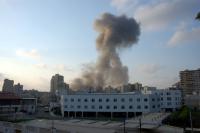-
Food crisis in northeast Nigeria drives youth to radicalize, join Boko Haram: UN
Urgent action is needed to provide farming and livelihood support to 385,000 people in parts of Nigeria’s northeast where food insecurity is rampant, the UN Food and Agriculture Organization (FAO) said. The UN agency noted that more than three million people are affected by acute food insecurity in Borno, Yobe, and Adamawa States. Failure to rebuild the rural economy will translate into lack of employment opportunities with possible harmful consequences including youth radicalization and enrolment into armed groups, resulting in continued civil unrest.
-
-
Android apps can secretly track users’ whereabouts

Three years ago, the FTC dimmed hopes for the Brightest Flashlight app for Android, slapping its developer with charges of consumer deception, because the app was transmitting users’ locations and device IDs to third parties without telling the users or getting their permission. Permissions, though, are only a small part of the Android-app privacy story. New research shows that Android apps can be manipulated to reach inside your mobile phone to track your whereabouts and traffic patterns, all without your knowledge or consent.
-
-
Protecting privacy in genomic databases
Genome-wide association studies, which try to find correlations between particular genetic variations and disease diagnoses, are a staple of modern medical research. But because they depend on databases that contain people’s medical histories, they carry privacy risks. An attacker armed with genetic information about someone — from, say, a skin sample — could query a database for that person’s medical data. Researchers describe a new system that permits database queries for genome-wide association studies but reduces the chances of privacy compromises to almost zero.
-
-
French girl, 16, to face charges for plotting a terrorist attack
A judge in France has agreed with the prosecution that a 16-year-old French girl should face preliminary terrorism charges for supporting ISIS and trying to plot a terrorist attack. The Paris prosecutor’s office said on Monday that the girl was using an encrypted social media app to spread calls by ISIS to the organization’s followers in France to commit violent acts.
-
-
Swedish charismatic church to drop Bibles from drones over ISIS-controlled areas in Iraq
A Sweden-based evangelical church has announced it would airdrop thousands of copies of the Bible onto areas of Iraq controlled by the Islamist ISIS. The church said it was part of an effort to “pass the hope and love of the Christian gospel” to people living under ISIS control. The church said the air drops were not a provocation, but was rather motivated by “unfailing and never-ending love” for all people.
-
-
Ahmadinejad demands Obama stop terror victims from collecting $2 billion court settlement
Former Iranian President Mahmoud Ahmadinejad sent a letter to President Barack Obama telling him to “quickly fix” a Supreme Court ruling allowing terror victims to collect $2 billion from frozen Iranian assets. The Supreme Court ruled 6–2 in April that 1,300 American victims of Iranian terror and their families were entitled to collect $2 billion in frozen funds, which are currently held in trust pending the final disposition of the lawsuits.
-
-
Former Bangladesh MP sentenced to death over 1971 war crimes
Sakhawat Hossain, a former member of parliament from the Islamist Jamaat-e-Islami party, was earlier today (Wednesday) sentenced to death by a special tribunal for commanding a paramilitary Islamist unit which killed, raped, and tortured unarmed civilians during the 1971 civil war in Bangladesh – then called East Pakistan. Jamaat-e-Islami, East Pakistan’s largest Islamist party, openly opposed secession from Pakistan and campaigned for continued Pakistani rule over East Pakistan. A few thousands members of Jamaat-e-Islami formed armed militias – trained and equipped by the Pakistani military – and fought along the Pakistani soldiers against fellow East Pakistanis.
-
-
Expert: Hezbollah’s storage of missiles in civilian areas will make next war “catastrophic”

The next war between Israel and Hezbollah “will be catastrophic” because the Iran-backed terror organization has stationed its military assets inside “built-up population centers in cities, towns and villages” in Lebanon, says an expert. In 2006 Hezbollah only had around 12,000 rockets and missiles at its disposal. It is now believed to have more than 110,000. Some analysts estimate that Hezbollah’s rocket and missile arsenal is greater than that of all twenty-seven non-U.S. NATO nations combined.
-
-
Brother-in-law of Charlie Hebdo killer arrested for trying to join ISIS
The brother-in-law of one of the gunmen who attacked the satirical magazine Charlie Hebdo in Paris in January 2015 has been detailed in Turkey, and deported to Bulgaria, on suspicion that he was trying to join ISIS in Syria. Mourad Hamyd was first arrested in January 2015 on suspicion that he was the getaway driver for the Kouachi brothers, who carried out the attack.
-
-
French Muslims propose tax on halal food to fund mosques, fight radicalization
Anouar Kbibech, president of the French Council of the Muslim Faith (CFCM), an influential group representing French Muslims, has proposed a tax on halal food to fund mosques and fight radicalization in France. The proposal was part of a broader counter-radicalization plan by French Muslims, a plan which also calls for the establishment of a new foundation which would help reduce the dependence of French mosques on foreign benefactors.
-
-
28-page section of the 9/11 Commission Report reveals “indirect link” to Saudi ambassador to U.S.
The 28-page section of the 9/11 Commission’s report, the only portion of the report not to have been made public, was finally released in July by the Obama administration (the section was, in fact, 29-page long). The heavily redacted version released to the public found an “indirect link” between a Colorado-based company associated with Prince Bandar bin Sultan, a key member of the Saudi royal family, who, for many years, wielded influence as the Saudi ambassador to the United States, and phone numbers held by an al-Qaeda member held over the 9/11 terror attacks. Money from a charity run by Bandar’s wife found its way to a Saudi man who helped two of the 9/11 hijackers settle in San Diego.
-
-
Indonesian police thwarts rocket attack on neighboring Singapore
Indonesia’s counter-terror police say they have thwarted a rocket attack on Singapore by arresting six suspected militants on Friday morning on Indonesia’s Batam island, about fifteen miles south-east of Singapore, a police spokesman said. Islamist terrorism in Indonesia, the world’s most populous Muslim nation, captured the headlines in 2002, when members of the Jemaah Islamiyah (JI) militant network killed 202 people, most of them foreign tourists, in Bali bombings. Since then, Islamist terrorist carried out smaller and less deadly attacks which targeted government agencies, mainly police and anti-terrorism forces.
-
-
Joy Karega, Oberlin professor who claimed Israel was behind 9/11, put on leave
Oberlin College professor Joy Karega, who was heavily criticized after she had posted Facebook status claiming that Israel was behind the rise of ISIS and the 9/11 and Charlie Hebdo terror attacks, has been put on leave and will be barred from teaching on campus while her case is reviewed, the school’s president said in a statement on Wednesday.
-
-
In dirty bomb prevention, Texas fails a crucial test
The clandestine group’s goal was clear: Obtain the building blocks of a radioactive “dirty bomb” — capable of poisoning a major city for a year or more — by openly purchasing the raw ingredients from authorized sellers inside the United States. It should have been hard. The purchase of lethal radioactive materials — even modestly dangerous ones — requires a license from the Nuclear Regulatory Commission, a measure meant to keep them away from terrorists. But a team of undercover bureaucrats with the investigative arm of Congress discovered that getting a license and then ordering enough materials to make a dirty bomb was strikingly simple.
-
-
German responses to terror range from cautious to conspiratorial
Until this month, Germany had been spared from terrorist attacks with momentous losses of life. Since 18 July, four attacks have occurred. While the attacks have been frequent, none has been as deadly as the attacks in Nice, Paris or Orlando. That is a perverse comfort in times when attacks occur daily. But Germans no longer feel like terrorism is a distant tragedy. Germany has yet to see large-scale terrorist attacks like those in France or Belgium. The sheer number of refugees and the limited number of attacks ultimately makes the link between refugees and terror weak. The polarization of political opinions about security, however, could threaten Chancellor Merkel’s chances for reelection in 2017.
-
More headlines
The long view
Factories First: Winning the Drone War Before It Starts
Wars are won by factories before they are won on the battlefield,Martin C. Feldmann writes, noting that the United States lacks the manufacturing depth for the coming drone age. Rectifying this situation “will take far more than procurement tweaks,” Feldmann writes. “It demands a national-level, wartime-scale industrial mobilization.”
No Nation Is an Island: The Dangers of Modern U.S. Isolationism
The resurgence of isolationist sentiment in American politics is understandable but misguided. While the desire to refocus on domestic renewal is justified, retreating from the world will not bring the security, prosperity, or sovereignty that its proponents promise. On the contrary, it invites instability, diminishes U.S. influence, and erodes the democratic order the U.S. helped forge.
Fragmented by Design: USAID’s Dismantling and the Future of American Foreign Aid
The Trump administration launched an aggressive restructuring of U.S. foreign aid, effectively dismantling the United States Agency for International Development (USAID). The humanitarian and geopolitical fallout of the demise of USAID includes shuttered clinics, destroyed food aid, and China’s growing influence in the global south. This new era of American soft power will determine how, and whether, the U.S. continues to lead in global development.
Water Wars: A Historic Agreement Between Mexico and US Is Ramping Up Border Tension
By Natasha Lindstaedt
As climate change drives rising temperatures and changes in rainfall, Mexico and the US are in the middle of a conflict over water, putting an additional strain on their relationship. Partly due to constant droughts, Mexico has struggled to maintain its water deliveries for much of the last 25 years, deliveries to which it is obligated by a 1944 water-sharing agreement between the two countries.
How Disastrous Was the Trump-Putin Meeting?
In Alaska, Trump got played by Putin. Therefore, Steven Pifer writes, the European leaders and Zelensky have to “diplomatically offer suggestions to walk Trump back from a position that he does not appear to understand would be bad for Ukraine, bad for Europe, and bad for American interests. And they have to do so without setting off an explosion that could disrupt U.S.-Ukrainian and U.S.-European relations—all to the delight of Putin and the Kremlin.”
How Male Grievance Fuels Radicalization and Extremist Violence
By Haily Tran
Social extremism is evolving in reach and form. While traditional racial supremacy ideologies remain, contemporary movements are now often fueled by something more personal and emotionally resonant: male grievance.
